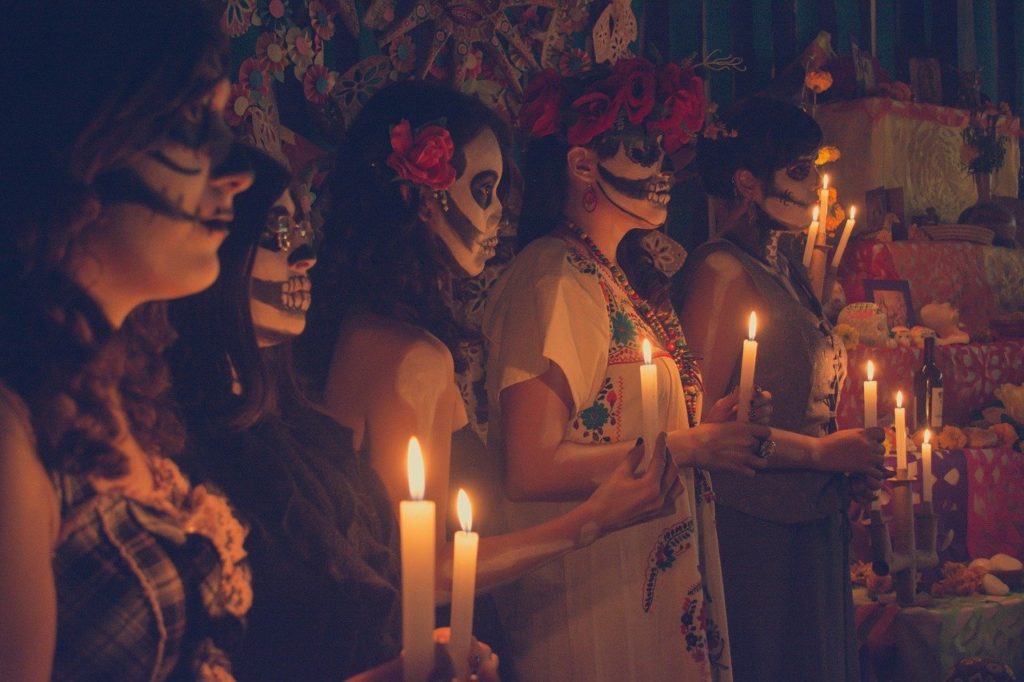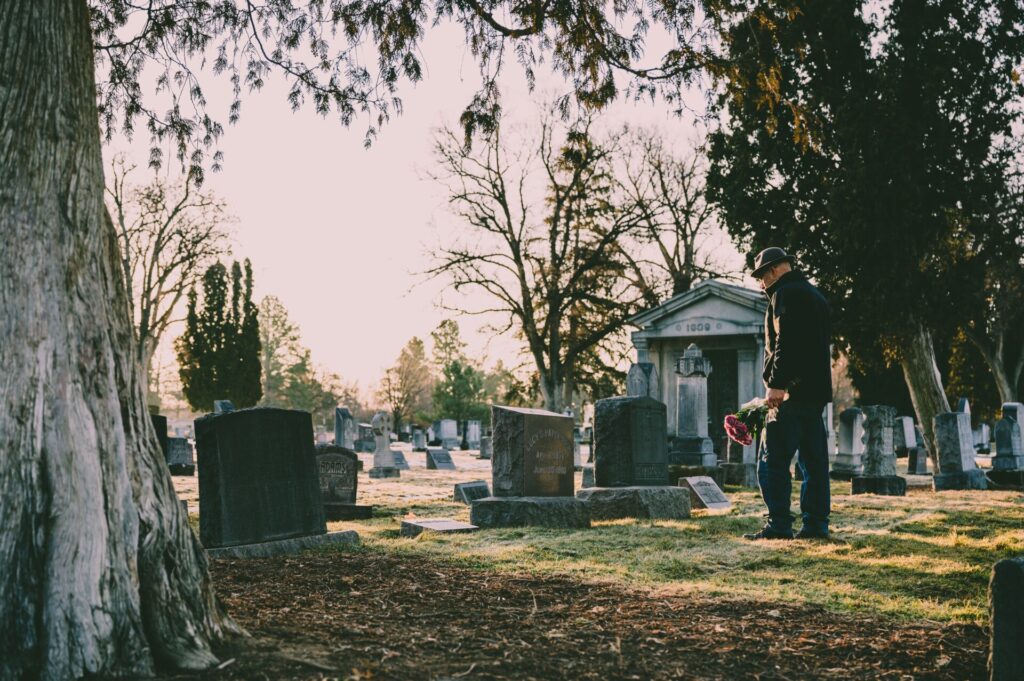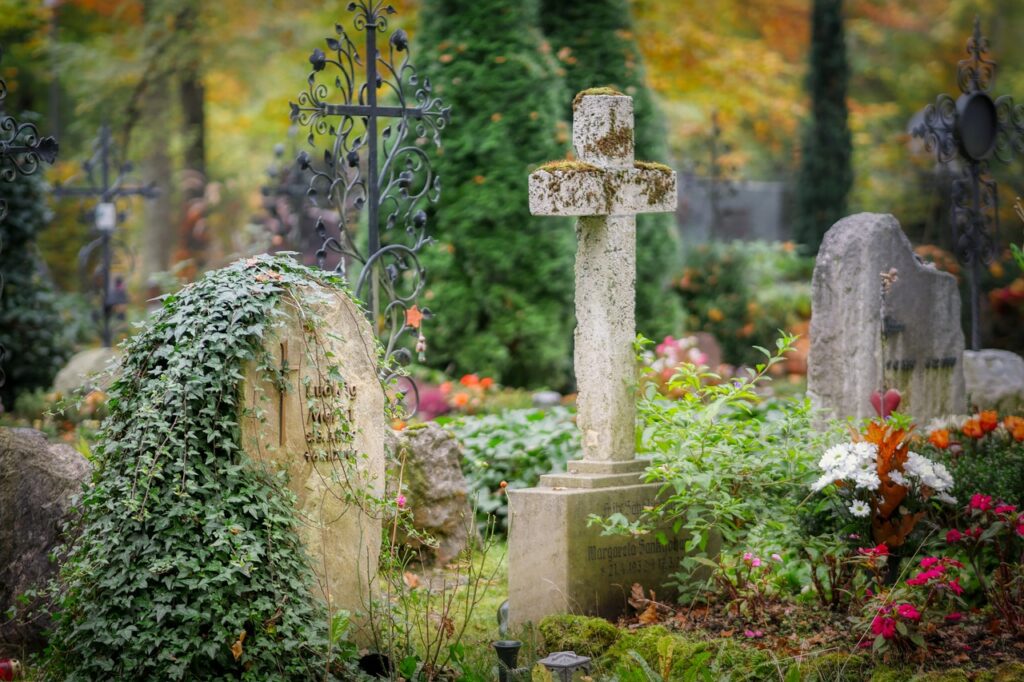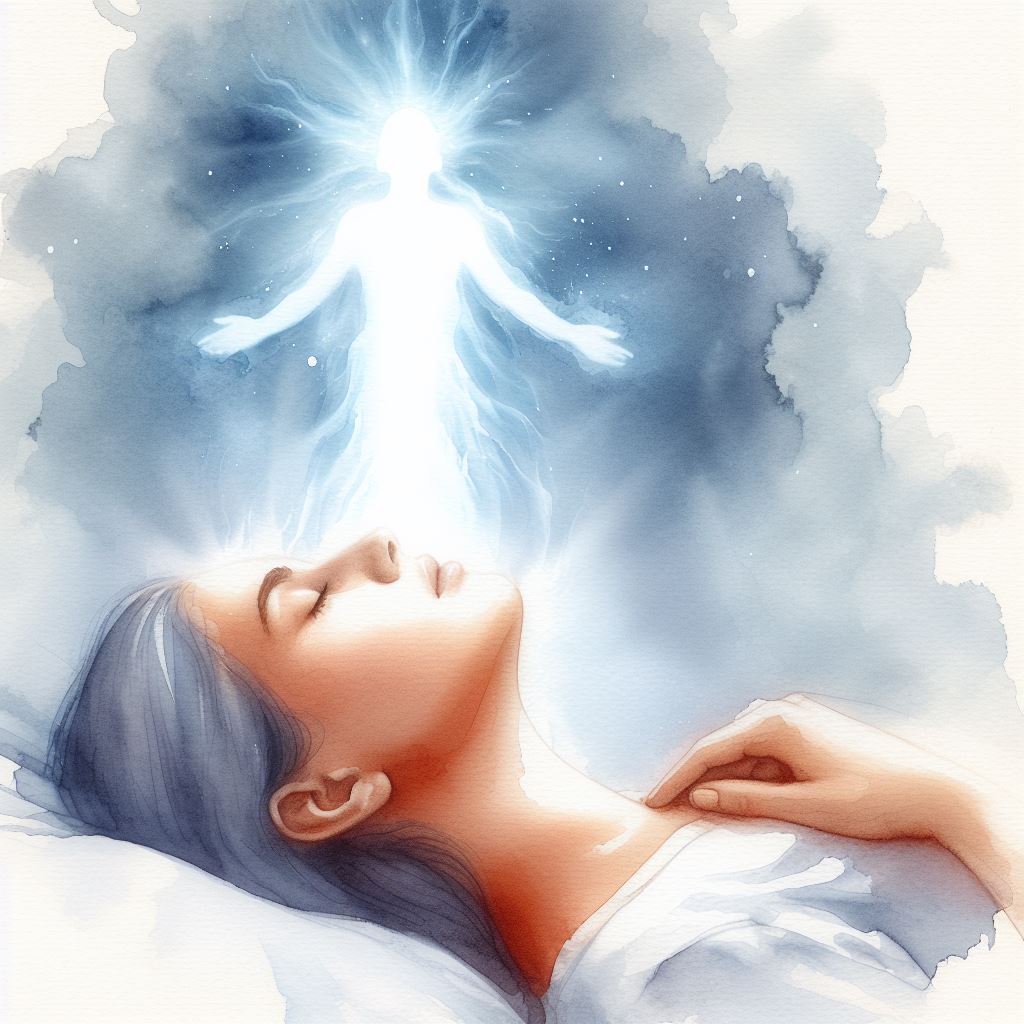What if the key to truly living is actually by embracing death? It seems counterintuitive, but the fear of death is actually worse than death itself. For many of us, this fear of not living prevents us from truly living, so why do we have it in the first place?
In our society, death has long been a taboo subject. It’s something that’s seldom discussed, and people go to great lengths to avoid the idea until it’s right at their doorstep.
But what if I told you that death is something beautiful? That it should be celebrated instead of feared. And the only reason why we fear it is because our perception of it has become distorted.
This is why we’re here today.
This article is here to help you change your perception of death. We’re going to look at death from a higher perspective because the fear surrounding it does not serve us.
So let’s look at what you can do to get rid of this stubborn fear.
Is it bad to fear death?

It’s completely natural to have some fear of death. After all, death is the biggest encounter with truth we will ever have. But if that fear of death is blown out of proportion, it can become a problem.
The fear of death can be an obstacle when it interferes with how you live your life. It can prevent people from reaching their full potential because people who fear death tend to take a conservative approach to life.
Your fear of death causes you to have limited experiences in life because you become overly cautious and avoid positive risks.
Let’s look at what happens when this fear gets out of control, and how overcoming this fear will benefit your life. To change your relationship with fear, read the article below.
Often people don’t fear death itself, but things related to death such as the suffering of dying, the dying process itself, or leaving loved ones behind. When we address each nuance of death and come to terms with the entire process, we tend to feel more at peace with the process.
The worst thing you can do is deny the reality of death until you no longer can.
Why the fear of death is harmful
When this fear gets out of control, it starts to affect your daily function and severely reduces the quality of your life. This exacerbated fear can lead to:
-
- Paranoia: Always thinking that something might happen to you, which prevents you from doing anything outside of your comfort zone.
- Poor judgment: Having a heavy fear of death can cripple your decision-making abilities. It also makes you more susceptible to being influenced or controlled, as external entities can manipulate you much easier by using your fear against you.
- Anxiety: The idea of death can make you feel anxious when going about your day-to-day life as something could happen, or bring up those uncomfortable emotions.
- Distress: You might become very worried about the fact that you and your loved ones are going to die. This creates a heavy burden that you need to carry with you until you let go of the fear of death.
- Denial: You may live your life denying that death is a part of it. When this happens, you’re likely to become avoidant of the topic or anything that brings it to mind. This denial inevitably causes problems such as repression, and it results in major limitations in your life. Sooner or later you will need to face it, so this pursuit is hopeless.
- Depression: Feelings of nihilism, that everything is hopeless, and there’s no point in doing anything with your life.
- Existential dread: In some cases, the exacerbated fear of death can lead you to an existential crisis. This state of panic can be a turning point in your life, but needless to say, it’s not fun to experience.
Benefits of overcoming the fear of death
Overcoming the fear of death benefits your life in many ways. Here are some ways that you will benefit from overcoming this fear.
- You stop living in fear: If you’re living in fear or always afraid of potential repercussions, life is going to be quite bland. By overcoming the fear of death, you feel liberated in a sense, and make the most of the life you’re given.
- You capitalize on your full potential: Without the barriers that are caused by fear, you’re much more likely to live up to your full potential. You might start traveling the world, trying new things, and embarking on new adventures. You might allow yourself to fall in love and start a family because you’re making the most of your life instead of worrying about what could happen.
- Peace of mind: There’s something beautiful about accepting the impermanence of life as it releases a heavy burden. This peace of mind is going to make your life much more enjoyable, as you’re not worrying about where it’s going, or what may happen.
What causes the fear of death?

Some people have a big fear of death, others don’t. If you are the former, it’s important to understand how this fear of death affects your life, and to what extent.
Here are some things that contribute to the fear of death:
- Biological drive: Of course, we are programmed to survive. All life is programmed to survive, otherwise, the species probably wouldn’t last too long. We are no exception to this rule, so naturally, we want to avoid death at all costs.
- Cultural norms: Death is a much more prominent part of some cultures, where people live in harmony with it. People in certain cultures have more exposure to death compared to a Western society where the idea of death is swept under the rug.
- Fear of the unknown: Many people aren’t as afraid of death as they are of facing the unknown. As death is the biggest encounter with the unknown that we can have, naturally, some people are going to be afraid of it.
- Fear of annihilation: The complete loss of self is a big fear for a lot of people. Regardless of what happens after death, the process of losing everything that you have ever known can be a scary thought.
- Loss of control: Death can seem like a really big ordeal to people who tend to hold onto control. If you have spent your life trying to be in charge of every little thing that happens to you, the realization that you’re at the complete mercy of the universe when you die can be uneasy.
- Past experiences: If you witnessed a horrible accident where someone died in a lot of pain, or perhaps you’ve seen the ugly side of death, this can affect your outlook on it.
- Existential beliefs: Your beliefs about the afterlife can turn death into something fearful. If you believe you’re going to hell, or that you will face some sort of repercussions for the life you’ve lived, this belief might cause you to latch onto life.
How I overturned the fear of death
I feared death as much as any person until I experienced ego death. This experience completely blew open my reality, and this was my first encounter with truth. Here you can learn more about this phenomenon:
After this experience, a couple of things changed in my life.
- I felt I had undergone the experience of death, so it wasn’t an uncertainty any more
- I instantly developed spiritual beliefs from this encounter
- I started making the most of my life, so I didn’t feel I was missing out
I feel that all of these ingredients were essential in helping me get rid of this fear. Many years later, I still have no fear of death, and because of this, I have explored my life without limitations.
Many people limit their lives to secure the life they’re living. They want comfort and security. Certainty. They want to endure, and sacrifice so much to do so.
But I was awake. I wanted to experience life, to soak as much up as I possibly could. So I traveled the world for many years. I explored different cultural beliefs, religions, and spiritual modalities such as shamanism.
Due to this pursuit of knowledge, my understanding of life after death broadened, and I became even more curious about what happens when we die (and what’s always here).
Personally, my pursuit of spirituality was a game-changer when it comes to the fear of death. If you believe that there is an afterlife, and that Earth is actually a pretty difficult place to be in the scheme of things, dying sorta feels like a get out of jail free card.
Changing your perception of death

Our collective perception of death is a massive downer because death is made out to be something unnatural. The stigma around death makes us associate it with horror, instead of portraying it as an inevitable part of life that is not only normal, but necessary.
What you need to do is start changing your perception of death, to see it in a different light – One that instills beauty, awe, and excitement.
Some cultures see death through a different lens though. They spend time with their dead, they don’t rush them away to a hospital to never be seen again.
Whether it’s dia de los Muertos in Mexico which celebrates death, or the Ma’nene festival in Indonesia which cleans the deceased and strengthens the bond between the living and the dead, we don’t view death the same way. If we’re all just a little more open about death and talk about it more, culturally, the stigma surrounding it will disintegrate.
I encourage you to see death in a way that excites you. I don’t mean this in the rushing to your grave sense, but in the sense that you really want to know what happens. I know that for me personally, I can’t wait to see what really happens for myself, and I mean that in the most uplifting way possible.
Don’t get me wrong, I love my life and plan on milking every moment of it. But this curiosity gives me something to look forward to. It doesn’t matter what happens in my life, if I achieve my dreams, or die sad and lonely because death looks the same for us all.
Are you able to find something exciting about death? Can you look at it in a way where it sets you free rather than imprisons you? Look at death as a get-out-of-jail-free card. Life is the hard part, what lies on the other side is not.
Cultivating a curiosity about death
Work on cultivating a curiosity about death, rather than associating it with negative thoughts and feelings. If you can learn to broaden your curiosity about death by digging deep into it, that same worry will gradually be replaced with wonder: A positive energetic outlet that improves your life experience, not takes away from it.
Therefore, don’t push thoughts of death and mortality away. Instead, illuminate it, and allow yourself to be fascinated by it. If someone close to you dies, of course, you should mourn but also reflect. Use this opportunity to think about the death process while it’s fresh in your mind.
I encourage you to think about death, wonder about it, and talk about it with people. Bring the idea of death to light, otherwise, it will stay in the darkness and remain as an unquestionable horror instead of a curious mystery.
Cultivate an understanding of impermanence
Understanding the nature of impermanence is needed to be at peace with death. Realizing the impermanent nature of all things helps you see the bigger picture: That nothing stops changing, and that we are also part of this river of endless change.
Everything in life is impermanent, from every emotion you experience to every difficulty you’ve had. The universe itself will end at some point, which makes time valuable for it’s finite. Does this thought stir up dread, knowing that your time is limited? Does it set you free, knowing that nothing really matters in the end, so why not enjoy the ride?
There’s beauty in knowing that everything you’re experiencing will end. So embrace it. Make the most out of this slither of consciousness that you’re experiencing right now.
Part of what makes life so exciting is that no matter who you are or what you do, your story will come to a close, sooner or later. So appreciate all the ups and downs! Pursue crazy opportunities and see what you can turn your life into. The clock is ticking.
Explore your existential beliefs
For me personally, believing in something beyond life has made a big difference in my perception of death. Genuinely believing that this universe is a tiny part of a much bigger system makes death seem like it’s not such a big deal.
Life is supposed to be one of the harder experiences a soul undergoes. So in that sense, would you rather stay here and struggle through the human construction zone, or enjoy the higher states of consciousness that we experience outside of these bodies?
Having spiritual beliefs makes the idea of death not just tolerable, but wonderful. Whether you have a nihilistic approach to the subject or not doesn’t matter in the end. You must agree that we don’t know for sure. Even if you believe that nothing happens, then it doesn’t really matter, does it? It would be like nothing even existed in the first place.
So why does it matter how painful the process of death is, or what you accomplish in life? Why does it matter how successful you have become, or how much money you made? If nothing exists, then nothing matters. If something exists, then everything probably matters. To me, this is a win-win.
Your spiritual beliefs and existential views can make the idea of death as something to look forward to, or as an unscalable object. Work on molding your views and beliefs to see the beauty in it all, and slowly over time, you will start appreciating your journey here.
I suggest broadening your understanding of spirituality and discovering beliefs that resonate with you. By forming your own beliefs and having faith in them, death is going to seem like much less of an obstacle and just another part of the journey. Below are some resources to explore life after death, and what it could mean.
Seek exposure to the unknown
A big reason why so many people fear death is because they’re not exposed to the idea of it. In Western culture, we don’t talk about it. We don’t acknowledge it. We don’t see it around because it’s hidden from the public. Other cultures have a lot more exposure to it, and this changes the person’s outlook on death.
Seeking exposure doesn’t mean you need to see a dead body or risk your life to have a close encounter. Exposure means to illuminate the idea of death by going to funerals, having discussions about it, and taking some risks that might make you think about it.
The more you expose yourself to the idea of death by unapologetically living your life, the more you’re going to desensitize from this irrational fear and see death as a natural part of life. Here are a couple of articles to help you expose yourself to life, to overcome the fear of death.
Let go of what you can't control
As the fear of death often stems from the need for control, it’s important to practice letting go of this need as your mortality is something that cannot be controlled. Acknowledge the things you can’t control, and accept them as a part of life. This is where learning to trust the universe makes a difference.
A better way is live is to focus on the things that you can control in your life. You can control the outcome of many things, and shape the life experience you’re going to have. But when it comes to trying to control something that’s so much bigger than you, the best thing you can do is let it go.
Is there life after death?

Ultimately, what eradicated the fear of death for me was cultivating a belief in life after death. If I was still an atheist, maybe I would be in your shoes too. But I’m not. I’m more confident than ever that the experience of consciousness continues after death.
Sure, it transmutes and changes form. You join the collective and branch off to experience your soul journey. You experience different dimensions and incarnate into different places. But it’s real.
After all, every body of knowledge believes in other dimensions. Every religion believes in life after death. All the best scientists and philosophers agree that we simply don’t know, and usually, they believe that there’s a whole lot more than what meets the eye too.
Believing in life after death has given me the ultimate comfort. Instead of holding onto life, I see it for what it is. A dream, a tiny figment of experience that god undergoes.
You can believe that there’s more to existence, you can believe that this universe is it. That’s really up to you. But if you do truly want to overcome the fear of death, I suggest that you start exploring what lies beyond this reality, and you might find some answers.
This is a topic that is simply too broad to explore here, but if you have a slither of curiosity, check out the article below, and let’s explore life after death:
Recommended resources regarding death and the afterlife

The Book of Five Rings
The Book of Five Rings is one of the most insightful texts on the subtle arts of confrontation and victory to emerge from Asian culture. Written not only for martial artists but for anyone who wants to apply the timeless principles of this text to their life, the book analyzes the process of struggle and mastery over conflict that underlies every level of human interaction.

The Tibetan Book of Living and Dying: The Spiritual Classic & International Bestseller
A newly revised and updated 30th Anniversary edition of the internationally bestselling spiritual classic, The Tibetan Book of Living and Dying, written by Sogyal Rinpoche, is the ultimate introduction to Tibetan Buddhist wisdom. An enlightening, inspiring, and comforting manual for life and death that the New York Times calls, “The Tibetan equivalent of [Dante’s] The Divine Comedy,” this is the essential work that moved Huston Smith, author of The World’s Religions, to proclaim, “I have encountered no book on the interplay of life and death that is more comprehensive, practical, and wise.”

On Death & Dying: What the Dying Have to Teach Doctors, Nurses, Clergy & Their Own Families
Fifty years after its original publication, a commemorative edition with a new introduction and updated resources section of Dr. Elisabeth K bler-Ross's beloved, groundbreaking classic on the five stages of grief.

Man's Search for Meaning
"Logotherapy makes the concept of man into a whole and focuses its attention upon mankind's groping for a higher meaning in life."

